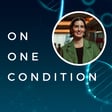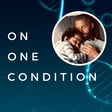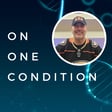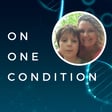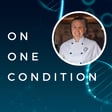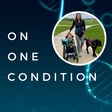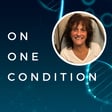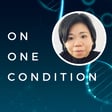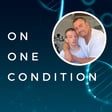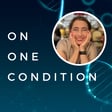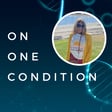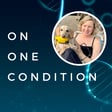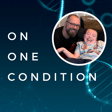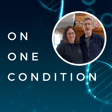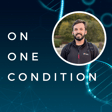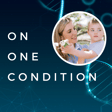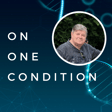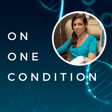Become a Creator today!Start creating today - Share your story with the world!
Start for free
00:00:00
00:00:01

Episode 42: Ray Huml - FSHD
Both Ray's children were born with FSHD (Facioscapulohumeral Muscular Dystrophy), a common yet lesser-known form of muscular dystrophy. He discusses the challenges they face daily, such as muscle weakness and limited mobility. Ray highlights the importance of the patient voice in understanding and treating rare diseases, drawing from his professional experience in the rare disease sector and his role as a father. He also touches on the role of community support and the ongoing need for research to better understand and combat FSHD and other rare diseases.
The song that Ray chose is SPACES, a song written by the Spinal Muscular Atrophy community and sung by James Ian.
Transcript
Introduction & Guest Overview
00:00:00
Speaker
Hi, I'm Sylvain Bertolo, and you're listening to On One Condition, a podcast to raise awareness about health conditions by listening to people who leave them every day. My guest today is Ray Hummel, and we're going to talk about FSHD.
Personal Experience with FSHD
00:00:17
Speaker
Hi, Ray. Thanks for joining me on the podcast. How are you doing? Oh, good. Sylvain, how are you? I appreciate being here today. I'm doing great, thank you. So I love starting with a song. Could you tell us which song you chose and why, please? So my professional favorite is a song called Spaces. Now, it may not be at the top of the Grammys or or get ah or get awards from maybe from popularity, but Spaces is a song that was created by the Spinal Mustard Atrophy Committee
00:00:48
Speaker
a community, and that includes the entire community. So all the way from the inception of writing the words, the music, actually the production of it. And it actually got a lot of awards. It's called Spaces, and the the singer is James Ian, and he lives with spinal muscular atrophy as well. And because I work in the rare disease world, I appreciate the efforts that it took for a community to do something like this. And I was proud that our company had a small role in helping to bring this to the market. It's gotten a lot of awards, so it gives me a lot of a lot of hope that other groups might be able to do something similar.
Understanding FSHD
00:01:22
Speaker
That's amazing. I love that. And yeah, something I'll try to find it because I want to listen to it. ah But I love it when the community comes together to do something creative and different. So that's a ah great song. Thank you for sharing that. And we might talk about community later as that's something we often talk about on the podcast. Before we go into and to anything else, would you be able to tell us what FSHD stands for and what it is? Sure. FSHD is an acronym that is um kind of used as a moniker because most people would rather not say, fascioscapulocumeral muscular dystrophy. It's kind of a mouthful.
00:02:13
Speaker
when i first heard the term um I was not familiar with it as I would imagine you and probably most of the listeners to this program would be. So I had to look it up on the web. And um I found out that even though it's a well-known disease, it's actually probably one of the most common muscular dystrophies. Some of its cousins are actually known quite more than that because they have more airplay. But FSHD is actually very common because it affects both men, women, and children. And and also, I base that on academic centers have reported that there's um
00:02:51
Speaker
It's a genetic disease for most people, but it does happen what they call a de novo mutation, meaning that you can have a mutation that just arises in a family and it didn't happen before, which is the case for my family. So that's how I was first introduced into the rare disease world because my daughter was diagnosed with that about 20 some years ago. Okay. So it's your daughter that has the the disease then?
Family Impact & Diagnosis
00:03:17
Speaker
Well, I actually have two kids and they both have the disease. But I didn't find out that my son had it until about six years after my daughter diagnosed it. In fact, I think I was like most parents. I had a little bit of denial. And I was told that each child had about a 50-50 chance of getting it. So since I had one, I figured hopefully the other wouldn't have it. But lo and behold, and there wasn't a, um you couldn't take a genetic test at the time. So my daughter was diagnosed clinically. But then when my son um was diagnosed, we actually had a genetic diagnosis which confirmed
00:03:51
Speaker
that he had had FSHG as well. Okay. How does it impact them? ah what's the What are the signs or the symptoms? Yeah, that's a great question. so When most people hear about it, they think fascio, face, scapula, your scapula, or your shoulders, and then your humerus, like your upper arm. But that's not really true. It actually affects all the muscles. It doesn't really affect most people that I've seen from a top down ah top-to-down
00:04:22
Speaker
base I've seen people that have problems with foot drop and inability to walk straight. I've seen people that because of the weakening of the muscles um sometimes they have spinal problems and curvatures which would require surgery to correct which was the case for my son and then um um as as the muscles weaken some people that have fs hd require a wheelchair which is the case for both my son and daughter Okay, so you said to start with that it's the most common musical dystrophy, but that it's not as well known because it had less airways than other musical dystrophy.
History & Awareness of Muscular Dystrophies
00:05:03
Speaker
Do you know why, despite it being more common?
00:05:09
Speaker
Well, one of the things that's been known for many years is that one of the first muscular dystrophy to be recorded was Duchenne muscular dystrophy. And that's a very severe muscular dystrophy and can shorten lifespan. So um most of the efforts have gone towards Duchenne muscular dystrophy. And then some of the others like amarydrifas, oculopharyngeal, myotonic and FSHD are all a little less known just because there hasn't been a lot of clinical trial research and news articles. When I was a kid, for example, in the United States, there was a very popular entertainer, Jerry Lewis, who used to have a telethon in the fall to raise money for the Muscular Dystrophy Association. And I watched that. And I remember my mom, who raised me and my three sisters um alone after I was about 10,
00:06:00
Speaker
um She didn't have a lot of money, but she always gave money to the March of Dimes and she always gave money to the Muscular District Association. And she said, boy, that would be terrible if that ever ah you know happened to our family. and um and And then as a kid, I never thought that would ever affect me, a muscular district, I mean. And now that it has affected our family, I have a whole different appreciation for A, what my mom did and B, for what other people are going through. It's interesting how you always look at something like this as where it's someone else's life. It's not mine. So you can keep your distance from it, even if you don't necessarily mean to. But then when it affects you, you suddenly find a ah new world that you have to embrace. Do you relate to that?
Professional Focus on Rare Diseases
00:06:46
Speaker
100%. No, I think it's exactly true. And what's happened to is it's expanded my, um, it's, it's changed me professionally and it's also changing personally. So professionally when the disease was, when my daughter was first diseased, um, long ago, um, I started to work with more and more, um, people that worked in the rare disease space. Cause I found it fascinating and I wanted to see what others were doing to see if it might help my own, my own children. And then um at the company I was working for, in addition to my other job, which was ah leading biosimilars, which is a copy of a biologic product that's out on the market. In addition to that, I started working on the muscular dystrophies and formed my company. And then I started taking over all the central nervous system rare diseases. So I got to know people that had similar but not the same. And then um and now in my current role, I actually
00:07:40
Speaker
um cover all the rare diseases, over 10,000 different rare diseases. So there's a lot of rare diseases, I don't know, but there are a lot of commonalities between rare diseases and there are certain things that work for some rare diseases that I'm sure will work for others even though they haven't been tried yet. Yeah. That's interesting. I want to go back to to your children a bit, but do you like talking about your work, and I guess that's made you very interested in rare disease, ah do you do you think you approach what you do at work differently because of your children? Absolutely. I think one thing that I'm convinced of
00:08:20
Speaker
is that I am a supporter of the patient voice um as much as anyone um because I see what it's like on a daily basis for what it's like to see my kids live with a progressive neuromuscular disease and I have empathy for other people that are going through the same thing. And I also realize that it's not altruistic. It's not just the right thing to do. It's actually financially savvy to talk to patients and find out when you look at a clinical trial and you look at what the burdens are to have a person have input from that because I would argue that patients are actually the best experts. I work with a lot of people that have MDs, PhDs and MBAs and they're very very smart and um but they still don't know as much as the patient because they don't live with it. So even if they've read a lot of papers if they don't live with it they still don't know a lot about it. I mean
00:09:09
Speaker
Some people like, um, if you want to ask about Parkinson's, um, a person I might talk to is Michael J Fox because he lived with it and um he's raised hundreds of millions, if not maybe billions of dollars for Parkinson's. So that guy is an expert, I would argue. Yeah, yeah, definitely. I fully agree. And that's something I've come to realize through this podcast, that the especially in the rare disease community, I would say patients really have to understand their symptoms better than the healthcare community, not because the healthcare care community is not good, but it it's so uncommon to see such patients that
00:09:52
Speaker
ah they most of the time have to explain what they go through and how to how they can be helped. and If you don't mind, we'll come back to the patient's voice in a
Research & Advocacy
00:10:06
Speaker
bit. But going back to your children, so how does FSHD impact them on a daily basis? Well, at one level, we kind of look at it as we're all in this together. So if you look at the last two white papers I published, one was on complex innovative designs. And by that, I mean things like master protocols or using Bayesian methods and prior information to inform future events, or even using things like external control arms for these are all clinical trial developments. And the fancy name is complex innovative design.
00:10:40
Speaker
And the FDA um has adopted them in order to try to accelerate rare disease drug development. And my son actually contributed to the paper, put a quote in the paper, and then I wrote another another paper, another white paper on rare epilepsies. um Because epilepsy is a pretty common condition, but the the things that um have to occur in some of the genetic mutations, only occur in a small number of patients. So there's over 60 different rare epilepsies identified. My daughter also lives with epilepsy in addition to her muscular dystrophy. So when we published the paper on that, she provided a quote for the paper on it. So we all do it together. We even all wrote a book together on rare disease drug development.
00:11:19
Speaker
And my daughter was influential on that because um after she read the book, she said, good job dad, but you need to put a little bit more on the patient's voice. And I said, what are you going to do that? And she said, I'll do that. So she wrote the chapter on the patient voice. It includes about 14 different people explaining their stories of what it's like to live with a rare disease. And I think the type of thing that you're doing here to try to get people to understand what it's like actually from people firsthand is actually better than sometimes a blog or something that is more static whereas you know we know that language is not just the written word that it includes intonation and other non nonverbal kind of things and those things are all equally important in order to get across the story because I think a lot of times even I hold a monthly meeting for rare disease drug developers
00:12:06
Speaker
And I know that a lot of people will forget some of the statistics and some of the figures and some of the infographics that I place, but a lot of people will not forget some of those patient stories or some of the caregiver stories um because they they touch a nerve or a person can relate to that or a person sees how someone's overcome a great challenge and figures, hey, maybe that I have some hope cause because I can overcome a great challenge if that person can as well. Yeah, I completely agree. Yeah. And that's why I love what you said about patients voice earlier as well. ah But so you said that your, your children are both in a wheelchair. Is that right? Yes, that's correct. Yeah. And so obviously it affects their mobility, but does FSHD affect them in any other way? Well, it, it, it, it weakens their muscles. So it has things that like, um,
00:13:01
Speaker
a couple things like that might not be readily apparent to someone who's not familiar with the disease. like Their eyelashes don't completely close at night, so they both probably have a little bit of dry eye. okay They can't smile like other people, so sometimes people say, come on, give me a smile, give me a smile. Well, that's one of the hallmarks of FSHDs, you can't smile. So when they had World FSHD Day, which was celebrated last month on the 20th, I believe it was, um they put an orange slice and in their mouth to simulate a smile. And the reason they do that is because people say we want to have more smiles for FSHD. So the fact that they can't smile doesn't mean that they're They're not trying to smile. and they They can't smile. So so that's that's a feature of it. And sometimes people take that as maybe something negative or a person's not not happy or they miscue it because they don't understand that. And then also, as the disease progresses, people have harder and harder time lifting up things and utilizing utensils. And I've seen people
00:14:01
Speaker
meet all kinds of things, assist the devices in order so that they can be successful. um But it varies among individuals. So I've seen identical twins with FSHD where one is clinically affected and getting worse. The other one is clinically unaffected. I don't understand why that does genetically. I've met families where they have two boys, one boy progresses rapidly, and another boy progresses very slow. Again, I don't understand why that is. So it's not, there's a lot of what they say, phenotypic diversity. So there's a lot of different heterogeneity between different people and it makes it harder to understand because when one of the things in drug development you try to do is understand the natural history of the event. So you'd like to say that, oh, by you know let's just say, for example,
00:14:46
Speaker
at At age 20, all people will go into a wheelchair, but that's not true. There's only a certain percentage will go into a wheelchair and others, I've met some people too, I've talked to and have FSHD that were diagnosed in their 40s and 50s. And they was wondering why they weren't good at sports or something like that. But then finally a student doctor pushed it and got them to get a test. And like I said, there wasn't genetic tests 30 years ago. So maybe they couldn't have even been at least genetically tested, although they could have probably been clinically tested. But then they got diagnosed and then everything kind of fell into place and they understood, oh, now I know why I was never that good at sports or I could lift my hands really well or something like that. Cause now it's starting to progress. So why would a person that's 40 or 50 years old
00:15:25
Speaker
be steady for all that time, and then another person you know seems to progress. It's not well understood. Yeah, that's why we need more research. Absolutely. Did you have any resources when your children were diagnosed to rely on, or how well was it known at that time? Well, in the United States, if you have a muscular dystrophy, you'll probably end up at an MDA care center. So that's the Muscular Dystrophy Association, and that's one of the largest patient acy groups in united states and like i said i knew about it from Jerry Lewis' kids from when I was a little kid. Not because it had affected my family at that time, but just because I knew my mom who, like I said, didn't have a lot of money.
00:16:03
Speaker
um we would donate a little bit of our money to that group So I was aware of them. So my um my daughter was misdiagnosed a couple of times by neurologists, but then eventually found herself to the MDA care center at a local clinic here. And a very astute neurologist said, I think this could be FSHD. And then they ran a multiple multitude of tests, and part of it was exclusion. So they they tested it for other things and ruled them out, and then finally came to the diagnosis. So the MDA was a very big center. And then once I found out that it was FSHD,
00:16:35
Speaker
there's a group called the fshd society That's probably the largest in the United States and maybe possibly the world. And I knew i reached out to the of the people that ran it at the time and it was a mother and son team. And the mother has since passed on and the son has passed the baton on to a new CEO. But I've remained very friendly with that group and they've been extremely supportive of my family. and um and i try to support them as well like for example we recently wrote this book on rareta disease, drug development, we negotiated rather than a 10% royalty and 12% royalty, but then we gave it all to the FSHD Society. So all all all the royalties go because I didn't want anyone to think I was profiteering from writing a book and making any money off of people with different diseases. So the perception was if I just donated the royalties, then then there would be hopefully that perception would be gone. Yeah, yeah yeah that's very good of you.
00:17:31
Speaker
Well, going back to that patient's voice then, so I keep thinking that there is progress, that we hear a lot more from patients in the clinical research. But i'm I'm always wondering if I'm being biased because of my interests. um and So do you like from your end do you see some concrete improvement in how patients are involved in the definition of clinical trials?
Patient Involvement in Clinical Trials
00:18:11
Speaker
Yes, I do. I used to say maybe seven or eight or nine years ago, I used to use this analogy. I would say if you talk to 100 C-suite level people, um so these are upper measurement people, and ask them, raise your hand if you don't think we should include the patient voice into rare disease drug development. no one would raise their hand. But the reality is if you ask those people to sacrifice part of their budget maybe or to to to actually change the way they they they do their work or make it extra hard for them, then only a fraction of those 100 people would actually step up and do that.
00:18:45
Speaker
because it changes the way you have to work. It might slow down and add a couple of extra steps. It's always typically seen that the PhDs and the academics are the smartest folks and typically they are but not always. um Typically the MDs are seen as the smartest folks and typically they are but not always. I really always felt that the patient voice needed to be included into every aspect of her disease drug development including when they finish the protocol to look for any burdens and things because a person that's academic who's never met a patient that has that disease might have their statistics down completely right but they might be missing the fact that like let me give you me an example in the muscular dystrophy world I've been involved with some trials years ago where they would want to get four or six muscle biopsies from someone's arm or their back or something like that to see at the beginning they want to see what the disease state was and then they check a couple of times throughout the study to see if there's some progress and then at the end
00:19:39
Speaker
and i've talked to many musard districty patient a groups and many of them are my friends the ceos are my friends and they all said we're not going to keep doing all these biopsies. People don't like to get biopsies they don't like punch biopsy the old ones used to be a punch biopsy where they would take a little punch your tissue out of your arm and you have to throw a suur in it to close it now they do it with them
00:20:00
Speaker
liver so it's much smaller but nonetheless they are taking a piece of your muscle and the general way people talk to me including my own kids will say hey my muscles are degenerating I hate to give up a you know part of my muscle so they don't want to do that now so now the patient's groups are advocating look you can do one at the beginning and you can do one at the end but we're not going to be taking multiple samples just because maybe in the future we could use them or we could freeze them or there might be some potential benefit that's not yet known that those days are over. You know you just do it at the beginning, do it at the end. Just do what you need to do to understand if there's a difference or not, but don't do more than that. so I think we need to listen to the patients. and Also, a lot of times people, like there's a lot of tricks you can do for listening to patients. so
00:20:40
Speaker
one that most people come to mind when i talk about listening to the patient is a one-to-one conversation. So reaching out the patient, talking to them, that's the obvious one. But the less obvious one about listening to the patient is also like listening to social media and minding social media and digital media. I mean, I would love to see someone um use an AI tool to look at every one of your podcasts and tell me what the 10 most important things are for people with rare diseases. I would love to know the answer to that. Like, I don't know if you'll ever do that, but if you could mine all of your podcasts and find out what they are, because they're all digital, right? so so you have them you know potentially you could do that ai
00:21:13
Speaker
i'd love to see a report on that. I would read it in a heartbeat because I think that would give you some insights the average person wouldn't have. Well, it's funny you you mentioned that. So I interviewed someone a few months back now about gout and they they did exactly what you mentioned where they had a I think it was a chat that people could use to just share experiences with their their their gout and they asked AI to analyze the chat and it
00:21:52
Speaker
I can't remember exactly the details now, but it really um made them realize that there were symptoms or conditions that they didn't know about or that were not that common, ah but that needed to be included in in the symptoms of related to GAP, for example. So yes, I fully agree. And I think there's more we can do, especially with social media. um
00:22:24
Speaker
Something that I've heard of as well is endpoint definition with patience. Is that something that you've had experienced or that you've heard of? Yeah, absolutely. So When I worked at a different company, I used to work with the Muscular Dystrophy Association because we were helping them with the registry. And a registry of patients is just that, right? You have a patient and you put some data, maybe demographic data or some data in about the patient. Maybe the patient has electronic health records and things like that.
00:23:01
Speaker
but so that's where they were and where they wanted to be and where I wanted them to be was to have a clinical trial ready network so that they could be there and a couple of things you need to do to be a clinical trial ready network is you have to make sure that the data that you collect is okay for the FDA or EMA to review. So you have to have access to the data and you have to be able to get that data. And it has to follow certain guidelines. So the United States, it's HIPAA. And then Europe has its own privacy regulations as well. You can't violate them because wherever you get the data from, whether it's a France or Germany or America, they all have their own rules and you have to follow them. I mean, that's that's the boundaries that of the industry that I work in. So you have to know all those rules.
00:23:43
Speaker
and um One of the things is if you're trying to make a person, if you can't cure a person, which is what everybody wants, if you can't cure them though, everybody agrees that if you could just stop the disease or even slow it down, those would be benefits. So um you really have to know what the disease is doing. And the the fancy name for that is a natural history study. So you you study what the natural history was in people for many, many years and determine where the inflection points are. So let's just say at 11 years old, most of the people go into a wheelchair. Well, then if you could have a drug and you study them and you find out that people don't point a wheelchair to the 16, well, that's a, to me, that's a huge improvement, you know, because you just delayed that. So you really have to know the natural history study. Now, some people say, well, how else can we tell
Challenges in Drug Development
00:24:29
Speaker
that we're doing something? So like, um, it used to be in the muscular dystrophy is they would say, well, how long a person could walk in six minutes? Cause if you can walk less, less than that would, that would do it. But then people said, well,
00:24:40
Speaker
Does that count? Can you carry a book or something to help balance you or can you carry a rod? Does that mean you can carry something in your hand? Do you have to have your foot reaching up as soon as you hit the stopwatch or is it when it goes over the line or or when both feet go over the line, then you hit the stopwatch? So there were some some variances that that that could do that. Also, if you took a child they saw and ran them for say eight hours in a car across 500 miles to get to the appointment and they were exhausted. What's the difference between that kid and the kid who came into town two, three days ago and then just had a couple of good nights rest? would Would they be different? And the answer is, of course they would. so so like so So then there's some problems with that. So then people would say, well, let's do a multi-domain thing. So there was a thing called a North Star Ambulatory Assessment.
00:25:28
Speaker
And it would include things not only just physical, but also maybe like patient reported outcome type things like how does a patient feel? Do they feel like they have fatigue? Do they feel good? or you know things and So you could use different domains. and and And that's what people look at. So to determine the correct endpoint for each disease is difficult. That's why that's why in the Duchenne muscular dystrophy, there's a protein they know that is insufficiently made. It's called dystrophin. and they don't have enough of it. So the idea is thinking is if you can if you can get some of it, then it'll add to a clinical benefit. And most people agree that's probably true. But now how much is it? Is it 1%? Do you have to get 5%? Is it 75%? Is it 62%? Nobody, that as far as I know, will agree on the exact number because I don't think there is one yet. But everybody agrees that if you if you don't have any dystrophin and you have all these problems, and people that do have dystrophin have less problems than you want to have the dystrophin.
00:26:22
Speaker
Sometimes people are done on what's called ah like a surrogate biomarker or a biomarker or something like that so that you could be reasonably predict that maybe there will be a clinical benefit based on something that else you can see. And those endpoints produce a lot of debate and a lot of conversation because in my world, you can have a person that has a Nobel Prize, but if it's not regulatory validated, even if the science is solid, if it's not yet regulatory validated, the most important thing is whether the regulator is validated because they're not gonna prove it if it's not validated yeah and they believe it's validated. So I've i've met some people that come up with some very elegant and very interesting science, but I always tell them, in order to use that tool, you have to have the regulator buy in. So, and that's that's a whole other conversation.
00:27:05
Speaker
yeah Yeah, but you when you explain the like the the feedback from patients about the six-minute walk, for example, that really made me think that incorporating patient's voice upfront it it should be a no-brainer because the patients, in your example, will ask that question to the sites. The sites don't own the protocol, so then they have to ask that question to the sponsor. And by the time the sponsor comes back to the site, the patient's not at site anymore. So like incorporating these comments, feedback, this input from patients at the start, surely everyone should see that it really saves a lot of time further down the line and it should improve the chances of and being having an approval from the regulators.
00:28:04
Speaker
Well, they are. And that's the encouraging news. I mean, the thing that's kind of nudged us is that now you're starting to see the regulators starting to put things in the regulations and regulatory guidance to say that it used to be we suggested and now they kind of demand that you have to come up with things like diversity, equity, inclusion plan, which diversity for me is not just whether you're black or brown or white. It's also whether you're having ambulatory status, what your socioeconomic status is. what your age is, what your gender is, what your sex is, what your sexual orientation. I mean, it's it includes a multitude of things. And we realize now that not everybody responds exactly the same. So that's why you really, in a way, diversity actually adds strength to our clinical trials and not take it away. Whereas in the rare disease world, the average thinking for many years was just, it's so hard to find these few patients. If we can just get them and they're all white, hey, at least we check the box and we've done everything we're supposed to do, it's the best we could do.
00:29:03
Speaker
And that was okay for years. But now people are saying, hey, you know, we need to include it. And there there are diseases that sometimes affect one ethnicity more than another. So there are, you know, there there has to be exceptions to every rule. But I do think that one thing that's really important for me is to try to include diversity. And another thing for diversity needs to me, especially working in the rare disease world, is disability. I'd like to see people with disabilities have the opportunity to go into a clinical trial. It's interesting because I and work in the world of clinical trials, and you would think that I would think every person should be in one.
00:29:34
Speaker
And the reality is is that I always tell people, I can't make up your mind whether you go into a clinical trial or not, but I personally believe everyone should at least have that option as a treatment. If it's out there, it behooves the community, the medical and healthcare community to let that person know at least it's out there. And that person with their healthcare team and their provider and their friends can decide whether the risk benefit is okay for them to do that. I mean, there's, there's some drugs like today, like you're aware of with sound gene therapies that it's called a one and done now. So because of the way they're delivered, um, your body will make it, uh, immunity to, to some of these vectors, like the AV vector. So that means you can only get that drug once in a time. There's a time where 10 years ago, if you only had one gene therapy,
00:30:17
Speaker
available than it was a no-brainer. You either did it or didn't. Now now in some areas, in some rare diseases, you have the kind that you have the opportunity for a patient to pick which one they go into and how do they decide. you know People ask me, which one's better? Is it this one or this one? Again, I'll tell them, I can't make the choice for you, but here are the things I've looked at. and I'll tell them just like a lawyer going into a courtroom here's the things you need to put on one side of your hand and here's the thing you need to put in the other hand and you've got to decide that the scales are in your favor that they you know potentially they could be advantageous to you or is it maybe may not do anything.
00:30:48
Speaker
And that's another reason why a lot of patients don't want to go into trials that have a placebo arm because then they have the opportunity to spend their time, but then they feel like it's wasted. But i I actually don't feel that's true because I feel like even if you're on a placebo arm, you're still adding to the science and then you can get around things like that. But once the trial's over and the endpoints are already met, you can have an open label extension so that the person could actually get the drug eventually, not not while the trial's going on and the science is being either formed or not formed but the but the ideal that that person should get it afterwards. there are but There are some tricks that you can use to get around those things and still be beneficial to patients. So when people tell me like drug developers or sponsors tell me, I don't think we can do that. There are some ways that I found over the years that that you can kind of get around a few of those things. The other thing about placebo is
00:31:34
Speaker
Everybody thinks about a one-to-one randomization, so you have one person on active and one person on placebo. But you could do two persons on active and one person in placebo, maybe. So that way you have more of a chance of getting in the active arm than in the placebo arm. And again, it's not that you'll never get in the placebo arm, but it's at least you have a less of a chance. Yeah, a lot of it is about education as well. I feel like we need to do more education around the clinical industry, get the the general public to learn more about it because like I don't feel like we can get out of this negative and view that a lot of people have about the clinical industry, unfortunately. I couldn't agree with you more. I think that's part of the reason why
00:32:19
Speaker
My daughter and son and I wrote that book on rare disease drug development and I wrote it with about 17 of my colleagues too because people, a lot of donors, like in the FSAP space, for example, they said, I want to donate, but why do things take so long? I don't understand. like It takes years for all these things to happen. And if you really understand the regulators trying to look out for the safety of individuals, you look out for the science and people trying to do things based on scientific methods and things like that, and you look at all the different stakeholders that are involved in drug development, that's part of the reason why it takes so long. It's interesting that we we we prove to ourselves as a as humans and as different geographies that we could have a warp speed
00:32:59
Speaker
Um, mentality for developing COVID drugs, which we knew were devastating to us. So why can't we adopt the warp speed mentality for rare disease drug development? Because I would argue that after you've met some of these people, especially ones that have life threatening diseases, like all pediatric cancers, for example, are rare. So if you talk to a couple of kids that have pediatric cancer or you talk to a family that's lost a kid to pediatric cancer or you talk to someone who's lost a kid due to the Shane Lusker District, I think even as a regulator, you'll understand that we need to have a sense of urgency that I don't quite see yet developed into the regulations or the guidances in FDA or even EMA, but they're getting better. I see in incremental process and I am hopeful that we are getting better and we're moving to a place where we're supposed to be, but I don't think we're quite there yet.
00:33:44
Speaker
No, but it's good to hear that from your point of view, you see some progress because I agree with you, we need to to be faster. And going back to the public opinion, i I've had many times people asking me, well, how did we do it so fast for COVID? But then it takes 10 to 15 years for anything else. So yeah, we need need to educate people.
Current Research & Future Treatments
00:34:08
Speaker
Is there any ah treatment for FSHD at the moment? currently know there's no cures, there's no disease modifying treatments approved. But I will tell you when I looked in this 20 years ago, there was very little going on other than natural history studies or vitamin studies or maybe looking at exercise or looking at the mental health of people that are
00:34:28
Speaker
that have fs hd and well Those were all very interesting and very good. They didn't leave their disease modifying treatment. that is That paradigm is changing rapidly. The science has helped in the last five or 10 years. They now understand that there's a protein that's overexpressed that appears to be toxic to muscle cells. It's called, they give it letters and numbers, DUX4. And there's one company that just announced some results that were shown that look appear very promising so while it's not, they don't have all the data in. So it's still a little early days. That looks very encouraging. There's another repurposed drug that's in the phase three of drug development and there's only really three main phases, phase one, two, and three. Phase four is typically considered post-approval or post-marketing study.
00:35:12
Speaker
and so they're in phase three and there is encouragement and I keep on keeping my fingers crossed and I look at the data very closely. The FS 60 Society does a fantastic job of giving seminars of people that are either involved in the study or just outside the study and give their views on it to keep people abreast. So there's a lot of people tuned in and you know listening to that um to see what's happening and are very hopeful that um one of those will lead to a treatment. I certainly hope for my own kids and I certainly hope for all those who I've met that that live with FSHD, that one of those does come to, at least one comes to, if not both, come to the market. And then there's others too that are in earlier stages of drug development. So I think when I first looked at FSHD, there was less than
00:35:54
Speaker
25 clinical trials on clinicaltrials.gov, which is a kind of um a marker for seeing what kind of clinical trials are out. And now there's over 75. So, I mean, you know, three times more is the way I look at it. It's like basketball. More shots you make, eventually one's going to go in. So, yeah and and also there's a correlation even when I've worked in finance where there the more funding you go in, the more chance of of ah rapid drug development in that space as well too. Well, that sounds very promising. That's good. And I like that you mentioned drug repurpose as well, because that's something that I'd like to see more again in our industry, because i I'm sure that there's a lot that can be done with treatment repurpose there definitely is in fact um I will tell you, I um ah recently wrote a paper, it's not yet published, but I'll be glad to share it with you when it's when it's out. It should be out by the end of next month. It's on use of artificial intelligence and machine learning to accelerate rare disease drug development. and um A lot of companies are using the tools now from AI where it would have taken you forever or would it would have taken you half your lifetime.
00:36:58
Speaker
to come up with them to look at all the different drugs and look at the mechanism action and look at what they might work in for all the different diseases and now they can do it much much quicker and as long as they have powerful machines they can put a ton of data and as long as they have enough data then they can have some kind of justification and Probability of success that it looks like it might work and i actually work with companies now they work in the repurpose space it makes a lot of sense because the fda is familiar with them. No safety profile their lower risk generally for capital investors so a third party capital investor will be more willing probably.
00:37:33
Speaker
put their money in ah in a drug where a lot is known about it than in a drug where very little is known about it, right? So it makes a lot of sense. I hope that that industry grows and grows and they use up every bit of you know possibility of every drug that could possibly work for a rare disease you know in tandem with looking for novel
AI in Drug Development
00:37:51
Speaker
solutions. So I believe in both approaches, but since the lower hanging fruit and the less risky fruit is worth the repurposed drugs, I'm still a fan of that type of drug development. Yeah, me too. And yes, I'd love to read your white paper, please. when It's really... I promise to send it. Thank you. Well, Ray, I think it takes us to the end of our time today, but it's been extremely interesting. Thank you. I always have the same question to everyone who joins me.
Personal Reflection & Gratitude
00:38:21
Speaker
ah What's your happy place? A place where you feel at peace?
00:38:26
Speaker
So my happy place has changed over the years, but my happy place now is I can walk. I live in a very busy congested city, but I can walk within about two miles of my house. There's three lakes. And I've watched bald eagles catch fish. I've had river otters come up to me within 20 feet. I've seen beavers build lodges. I've watched all kinds of different animals and that's my happy place. I'm a veterinarian by training so I've always loved the outdoors. I've always loved nature and I find a certain piece in nature and a certain thing that I don't worry about world events. I don't worry about rare disease. I don't worry about any financial problems that I have.
00:39:03
Speaker
i Don't really worry about anything for a little while and I kind of you know commune with nature a little bit and that's that's my happy place so um You know it's it's interesting when you're still because there's people we we tend to rush and we tend to want to try to get as much done in the day and if you just stay still for say a half an hour and on a ah lake um you won't believe what you see you might actually be surprised because i was surprised because it was for so many years that i kind of walked away from that but there's a lot of things you can see if you just stand still and um and it's interesting i think sometimes we need to stand still because there's so much hyperactivity i don't think it's good for our spirits or our souls and as people i think sometimes we need to kind of unplug and get away from it all.
00:39:45
Speaker
I couldn't agree more and it sounds like a lovely place to be. So yeah, that makes me feel better just listening to you. Well, thank you so much, Ray. I really appreciate your time. It's been extremely interesting. yeah I've really enjoyed our discussions and I'm sure everyone who listens to it will do as well. So thanks a lot. Thank you, Sylvain. I really appreciate the opportunity. It's a pleasure to get to know you. I'm thankful for what you do for all the communities, not just the rare disease, but also the more prevalent disease communities as well.
00:40:19
Speaker
ah thank you i appreciate that
